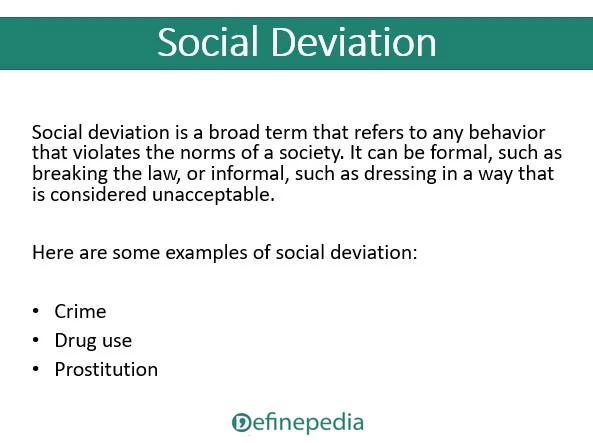Introduction
The study of social deviation, it’s cruical too address the heart-wrenching issues faced by individuals and communities. It enables us to extend empathy to those unfairly labeled as deviants, due to factors beyond their control, such as genetic predispositions to addiction.
Understanding social deviation is vital to break the stigma surrounding mental illness offering support too affected families. Moreover, it’s essential for reforming a criminal justice system, that often perpetuates injustice and fails too address underlying societal issues.
Definitions
James H. Henslin said that “All violations of social rules, regardless of their seriousness.”
Wickman said that “Deviance is behaviour that violates the standards of conduct or expectations of a group of a society.”
Hat-ton and Hunt said that “Any failure to conform to customary norms.”
What is Social Deviation?
Social deviation refers to behaviors, actions, or traits that deviate from the norms and values of a society. It’s like stepping off the path that society expects you to follow.
Biologists argue that deviation is natural due to individuals’ physical structures and genetic disposition, with factors like low intelligence, XYY chromosome theory, and body type contributing to deviant behavior.
Psychologists attribute deviation to personality disorders and deviating personalities resulting from physical defects.
Sociologists argue that social environment, socialization, sub-culture membership, and social class play crucial roles in inclining individuals toward social deviation. They suggest that people learn deviation from their social connections, such as family, friends, neighbors, and sub-cultures.

Why is it Important to Study Social Deviation?
Understanding social deviation is crucial for several reasons:
Maintaining Social Order: By studying social deviation, we can identify and address behaviours that might disrupt the harmony of a community.
Promoting Tolerance: Knowledge about social deviation can lead to greater acceptance and empathy toward individuals who deviate from societal norms.
Preventing Crime: Insight into social deviation helps law enforcement and policymakers develop strategies to prevent criminal activities.
Biological Explanations of Social Deviation
Let’s explore some biological factors that may contribute to social deviation:
Genetic Factors: Some individuals may inherit genetic predispositions that make them more susceptible to certain behaviors. For instance, studies have shown a genetic link to addiction and aggression.
Biochemical Factors: Chemical imbalances in the brain can influence behavior. For example, an imbalance in neurotransmitters like serotonin can lead to mood disorders.
Psychological Explanations of Social Deviation
Here are some psychological factors to consider:
Personality Disorders: People with personality disorders, such as antisocial personality disorder, may exhibit deviant behavior due to their distorted thinking patterns and inability to conform to social norms.
Mental Illness: Mental health conditions, like schizophrenia or bipolar disorder, can lead to behaviors that deviate from societal norms.
Sociological Explanations of Social Deviation
Now, let’s examine sociological factors:
Socialisation: The process of socialization plays a significant role in shaping our behavior. Different socialization experiences can lead to varying degrees of social deviation. For example, someone raised in a violent environment may exhibit aggressive behavior.
Culture Conflict: When individuals from different cultures come into contact, conflicts can arise due to differences in values and norms. These conflicts may result in social deviation as individuals navigate conflicting cultural expectations.
Social Control: The mechanisms society uses to maintain order and conformity, such as laws and norms, can influence social deviation. A lack of effective social control may lead to increased deviant behavior.
Types of Social Deviation
Crime: Criminal activities, such as theft, fraud, or violence, are perhaps the most recognized form of social deviation. Legal systems are in place to address and punish criminal behavior.
Deviant Subcultures: Certain groups or subcultures may embrace values and norms that differ from mainstream society. Gangs, for instance, often have their own deviant subculture with its own rules and values.
Mental Illness: As mentioned earlier, mental illness can lead to behaviors that deviate from societal norms. It’s important to approach these individuals with understanding and support rather than stigmatization.
Was this helpful?
0 / 0